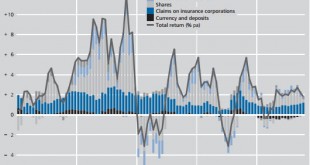Germany's Finance Minister Wolfgang Schaueble has long been critical of ECB monetary policy,. But now, as Reuters says, the gloves are off. In a speech at a prizegiving for an ordoliberal economics foundation last Friday, Dr. Schaeuble demanded that the ECB raise interest rates.The justification? Very low interest rates hurt Germany's savers, which are the bedrock of its economy.There is a political dimension to this. Dr. Schaueble's party, the CDU, is losing popularity and desperate for...
Read More »Marx’s Capital, Volume 1, Chapter 23: A Critical Summary
Chapter 23 of volume 1 of Capital is called “Simple Reproduction” and deals with capitalist accumulation on an unchanged base of capital (Brewer 1984: 67).This Chapter begins Part 7 of volume 1 called “The Process of Accumulation of Capital” (which includes Chapters 23, 24, and 25).For Marx, there is a process called the circulation of capital: “The conversion of a sum of money into means of production and labour-power, is the first step taken by the quantum of value that is going to...
Read More »Marx’s Capital, Volume 1, Chapter 22: A Critical Summary
Chapter 22 of volume 1 of Capital is called “National Differences in Wages” and deals with the various factors that cause differences between national wage rates. For Marx’s views on how the value of labour-power is determined as a subsistence wage, see his analysis in Chapter 6 of volume 1.Marx reminds his readers of the discussion in Chapter 17 and the issue of how the subsistence wage may vary: “ … the quantum of the means of subsistence in which the price of labour is realised might...
Read More »Marx’s Capital, Volume 1, Chapter 21: A Critical Summary
Chapter 21 of volume 1 of Capital is called “Piece Wages” and deals with wages paid by the number of output goods produced.A “piece wage” is a wage payment by quantity of products or units produced by a worker.Time wages and piece wages both exist and sometimes side by side. Marx argues that “[w]ages by the piece are nothing else than a converted form of wages by time, just as wages by time are a converted form of the value or price of labour-power” (Marx 1906: 602).But piece wages conceal...
Read More »Marx’s Capital, Volume 1, Chapter 20: A Critical Summary
Chapter 20 of volume 1 of Capital is called “Time-Wages” and deals with wages paid by the hour.Wages can take various forms but the two fundamental forms are time wages or piece wages (Marx 1990: 683).In essence, the hourly wage can be calculated by the value of a day of labour-power (the subsistence wage equal to the value of the maintenance and reproduction of labour-power) divided by the number of hours in a working day (Brewer 1984: 64). As the working day rises so the hourly wage rate...
Read More »Marx’s Capital, Volume 1, Chapter 19: A Critical Summary
Chapter 19 of volume 1 of Capital is called “The Transformation of the Value (and Respectively the Price) of Labour-Power into Wages” and discusses how capitalist wages conceal the reality that the wage is a payment for the value of the maintenance and reproduction of labour (Harvey 2010: 242), a subsistence wage, which is equal to the necessary part of the working day. But capitalists generally pay hourly wages so that this alleged reality is obscured (Brewer 1984: 63).The use-value that the...
Read More »Marx’s Capital, Volume 1, Chapter 18: A Critical Summary
Chapter 18 of volume 1 of Capital is called “Different Formulae for the Rate of Surplus-Value” and Marx discusses his basic formulae here.For Marx, the rate of surplus value is represented by these formulae:Surplus value = s = Surplus value = Surplus labour —————————— —— ———————————— —————————— Variable capital v Value of labour power Necessary labour The first two formulae are expressed in values, but the third is a ratio of the relevant quantities of time (Marx 1990: 669). For Marx,...
Read More »Marx’s Capital, Volume 1, Chapter 17: A Critical Summary
Chapter 17 of volume 1 of Capital is called “Changes of Magnitude in the Price of Labour-Power and in Surplus Value” and discusses how capitalists extract surplus value in relation to wages.Marx divides the chapter into four sections: (1) Length of the Working Day and Intensity of Labour Constant. Productiveness of Labour Variable.(2) Working-Day Constant. Productiveness of Labour Constant. Intensity of Labour Variable.(3) Productiveness and Intensity of Labour Constant. Length of the...
Read More »Marx’s Capital, Volume 1, Chapter 16: A Critical Summary
Chapter 16 of volume 1 of Capital is called “Absolute and Relative Surplus Value” and discusses the nature of labour, surplus value and surplus labour time. This chapter begins Part 5 of Capital (which comprises Chapters 16, 17 and 18).Marx opens his chapter with a discussion of the nature of productive labour. Under the capitalist mode of production, the commodity ceases “to be the direct product of the individual, and becomes a social product, produced in common by a collective labourer,...
Read More »Marx’s Capital, Volume 1, Chapter 14: A Critical Summary
Chapter 14 of volume 1 of Capital is called “The Division of Labour and Manufacture” and examines the nature of division of labour in early manufacture from the mid-16th to the late 18th centuries.Marx divides the chapter into five sections: (1) The Dual Origin of Manufacture.(2) The Specialised Worker and his Tools(3) The Two Fundamental Forms of Manufacture(4) The Division of Labour in Manufacture, and the Division of Labour in Society(5) The Capitalist Character of Manufacture. It is...
Read More » Heterodox
Heterodox


